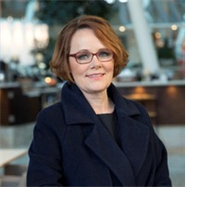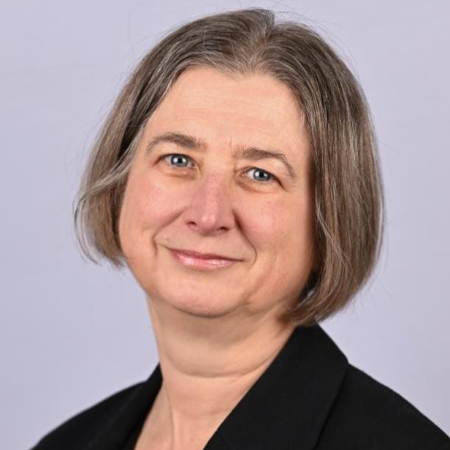Keynote: Opening up EKN's one-stop guarantees shop
EKN had a banner year in 2019. EKN’s director general, Anna-Karin Jatko tells TXF about the rise of supplier credits for larger contracts, and how as part of ‘Team Sweden’ she has put sustainability, digitisation and the simplification of export finance at the top of the Swedish ECA’s mission statement.

 Anna-Karin JatkoTXF: How was 2019 for EKN and how would you characterise the market for export support in general? More complexity in the larger deals, more standardisation in the smaller ones?
Anna-Karin JatkoTXF: How was 2019 for EKN and how would you characterise the market for export support in general? More complexity in the larger deals, more standardisation in the smaller ones?
Anna-Karin Jatko (AKJ): To set the stage, we had a record year last year guaranteeing 2,135 new transactions. Also the volumes remained high (at SEK54.2 billion ($5.6 billion)) and we have exposure in 140 countries. There were a few large deals, which comes with the territory, and a large increase in SME customers, which is important to us.
Interestingly, we had big and small contracts, sometimes SMEs had large transactions and sometimes we had large companies with small tickets. It’s a really unusual combination that has been growing and came to fruition last year.
Another interesting trend was supplier credits are now being used for larger contracts. That’s understandable as some buyers want to avoid long term bank loans and banks can discount the invoices. It’s a challenge as we and the banks have not been used to that type of documentation and to working in that fashion.
Normally, banks would lend to the buyer and we would offer one type of guarantee. And now the companies themselves are actually offering supplier credits also for very large deals.
TXF: What types of buyers are asking for it, EPCs?
AKJ: We don’t have any EPCs at all in Sweden now, not the big ones that work internationally, although some are trying to grow. We are talking about telecoms, engineering, trucks, transportation using supplier credits. It’s a trend and not just from one industry.
TXF: And they’re coming direct to EKN and not via banks?
AKJ: Direct. The banks are not always in the transaction. Exporters just want to sell and get paid. Banks want to do buyer credits, but some corporates just don’t want to have bank loans, so exporters come direct to us for guarantees and sometimes afterwards they’ll get bank financing on those invoices.
TXF: How are you evolving your product suite to meet these changing demands?
AKJ: As we’re issuing guarantees we’ve been working on strengthening the terms and conditions to really stay ahead and strengthen the value of the guarantee and that the banks can meet their regulatory requirements. We launched an additional guarantee condition this year just to make sure that banks who are under regulatory pressures and need it to match specific requirements.
We’ve also been increasing our support to SMEs. Around two-thirds of the number of transactions guaranteed for this group were not export credits but working capital guarantees or counter guarantees for bonds for SMEs to meet their financing challenges.
TXF: In terms of the larger deals you’re doing, are they becoming more complex and slower as others in the industry are saying?
AKJ: I wouldn’t say so, it’s on a case by case basis. We’re an old hand at the telecoms sector, and not least the big deal with the 5G telecoms in the US in the last two to three years. We have also seen the sustainably rewarding sector of wind, in particular with the ongoing Hornsea 1 project in the North Sea [one of TXF’s 2018 Perfect 10 deals of the year], which we worked on with our Danish colleagues at EKF.
We are seeing more complex and sustainable transactions where some Swedish technology offerings are brought to the fore. One deal we did for [new buses for the TransMilenio] Bus Rapid Transit (BRT) in Colombia with local currency financing which supplied buses to Bogota [Scania and Volvo were suppliers to parts of the project]. It was a complex transaction, with some intricate financing solutions, which is a way the banks are responding to market demand and risk mitigation.
TXF: How is your pipeline looking?
AKJ: A lot of things were started last year and one was to focus on the EPCs and international banks. We held seminars in Istanbul and Madrid to promote what we offer. We may not have Swedish EPCs as such but as some large EPCs can source from wherever, we are showcasing our interesting financing offer – which combines EKN and the Swedish Export Credit Corporation (SEK) [SEK funds many projects that EKN guarantees] – and once they see the amplitude, they can source from Sweden. We are hoping to close some deals on the back of that.
It’s a different way of supporting exports where, since 1933, you used to have a transaction and then looked at finance. Now the focus is on the EPC and international banks to ensure they know what type of offering we can put on the table and thereby interest them in sourcing from Sweden.
We also have a few railway projects in Africa. Scania has just released that they won a huge contract for BRT in Ivory Coast with our support. And the US is not the only country upgrading their 5G – so there will be others, though perhaps not immediately in Europe, which has been slow to upgrade, but it will happen.
We’re growing our business in medtech, which is helping diversify our portfolio, for instance with Getinge (a Swedish medical technology company which uses EKN supplier and buyer credits financing hospitals in places such as Amman, Jordan).
TXF: How high a worry for you is competition with other ECAs and the need to reform the OECD Consensus?
AKJ: For a small export-oriented country, we really want to ensure there’s a level playing field and updating the Consensus is long overdue. That’s partly because there are a number of big players who are not under the scheme and partly because Sweden has long been a champion of increasing local content rules from 30-50%, which is in line with global developments. For all of us to stay relevant, we need to both show a level playing field and be in line with economic development.
Is it concerning? Yes, the longer you leave it, the more irrelevant we become, in a way. And that's never a good starting point.
TXF: Will it be resolved this year?
AKJ: That’s the thousand dollar question. I’d like to be optimistic. We should see some movement as there’s a general realisation that something needs to be done. There are a number of proposals and we’re not starting from scratch. The WTO General Meeting in Kazakhstan in the summer will be important, though the WTO itself is not exactly up and running.
TXF: How do you view local content rules – do you want local content to be higher?
AKJ: Our approach is obviously to adhere to the Consensus, and if you don’t nobody will. Swedish companies, and the global value chain, is now so complex and intricate that you need to source local content, particularly for the larger EPC constructions. It makes sense as it is more efficient. It also helps the countries to gain knowledge, especially when it comes to infrastructure. When the 30% rules were set years ago [the cap was originally 15% and Sweden was one of the original champions for its increase], it wasn’t so easy to source locally, so it made sense back then. That has changed and we advocate 50% as local content helps with transferring technology and helping sustainability.
TXF: What about national content rules – are you advocating the same ‘hub’ style approach that some ECAs are taking, where their content doesn’t need to be made in the ECA’s home country?
AKJ: We have a flexible mandate. We are not ‘made in’ Sweden but ‘made by’, and we can look at transactions in a coherent and flexible manner. We also frequently reinsure content with a number of other ECAs. For instance, covering a large transaction, if it has large amounts of Swiss content, we can reinsure it with our Swiss counterparts and vice versa. We’ve got a number of deals under discussion like this, and it’s one way of dealing with that question.
Also, there’s nothing saying we can’t, for instance, guarantee 100% Finnish content and there is no minimum made in Sweden content per se.
TXF: And do you welcome the return of US Exim?
AKJ: Yes. The more of us that adhere to the OECD Consensus the better, particularly if we want to achieve sustainable development goals (SDGs). For instance, one of the estimates for achieving SDGs is 40% of capital needs to be privately financed, so the more ECAs that can guarantee the capital, the easier it will be to achieve SDGs, so it’s good that US Exim is up and running.
TXF: You have been making progress in digitisation. To what extent is EKN going to be a one-stop shop?
AKJ: We’ve had an online tool for exporters for a long time and we’ve finally developed a digital solution for banks which can now join our system as well. Our aim is to ensure no more paper for insuring guarantees. In terms of buyer credits, one of the stumbling blocks for digitisation was the need for a digital ID, in addition to the e-ID available to customers in Sweden. We have created our own ID option, EKN e-ID, and any client should be able to join the system and it will be faster and easier to access.
We want to be a one-stop shop where it comes to guarantees – though not in the same way where some countries join the promotion and the financing together.
We have a very close cooperation with SEK under the umbrella of ‘Team Sweden’. We provide the guarantees and SEK provides the funding and we have done a lot of joint promotions and transactions. It makes us an appealing prospect for EPCs and international banks.
TXF: Should ECAs join forces with their positions on sustainability globally?
AKJ: We have a new sustainability policy where we take into account both the UN SDGs and the Paris Agreement into our policy. We are one of the first ECAs to incorporate both facets into policy.
Sustainability risks are effectively a financial risk. The OECD has a sustainability working group and the same arguments apply on levelling playing fields as it does with the OECD Arrangement as not all non-OECD countries adhere to the same sustainability goals. There is definitely a need to move ahead more jointly, and one goes with the other.
We are aligned with the OECD on the discussion around coal power plants, and EKN and SEK have been tasked by the Swedish government to phase out guarantees for prospecting and extracting fossil fuels by 2022.
TXF: Do you think deals are going to be more complex and structured going forward?
AKJ: Some of them. But we also need to be working at simplifying both in terms of our terms and conditions, but also working methods with the banks, etc.
Because in some countries, especially when it comes to sovereign risks, if you want to conclude a deal, you need to do it in the right timeframe. We really need to ensure that we, and the banks, are as fast as each transaction requires. And that's a particular challenge because there's a lot of risk. A lot of the risk assessment is absolutely necessary when it comes to social and environmental risks, which takes time.
But the more we have actually developed our working methods with the banks, not least when it comes to sustainable risk assessment, the faster we can actually conclude transactions (in some of the countries). And we need to ensure we use the full capability of digitisation.





